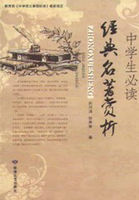The Tale of a Cultural Translator
An idiomatic expression is a fixed group of words with a special meaning which is different from the meaning of the words that form it.Idioms are usually semantically opaque, i.e.metaphorical rather than literal.So the meaning of“to draw a blank”has nothing to do with the meanings of the separate words; it means“to fail to discover or find out about something after searching hard and asking many questions”,as in“I lost my coat yesterday, and have looked for it everywhere, but so far I ve drawn a blank”.
Besides semantic opaqueness, many English idioms are characterized by structural invariability.Their form is often fixed.The words in idiomatic expressions cannot, as a rule, be deleted, added to, replaced by synonymous words, or put in a different order, without affecting or destroying the meaning.
Obviously,idioms cannot be reworded without destroying their sense.Compare the following sentences:
I expected him to kick the bucket and kick it he did.
I asked him to write a letter to my aunt,but not to write it in English.
The first sentence mixes metaphorical and literal meaning, and is normally unacceptable, unless one is trying to be humorous.The second sentence,however, is quite acceptable, for“to write a letter”is a free phrase and the object“a letter”can be replaced by a pronoun in the subsequent clause.Thus metaphorical meaning is related to structural invariability in idioms.
There are many different sources of idioms.A large number of idiomatic phrases were invented by men and women engaged in various occupations and activities.The Bible and the works of great writers form the rich literary source of English idioms.
Of the various aspects of language construction, idioms show perhaps the greatest variety and are also the hardest to classify.
Verb phrase used as idioms are the most important type of English idioms.
Phrasal verbs are idiomatic combinations of a verb and adverb, or a verb and preposition.Most of them are made up of one-syllable words, and are of Anglo-Saxon origin.They are often nearly synonymous with a loan word of Roman origin,but“being more expressive”are often preferred to the latter.
The meaning of idiomatic expressions can be very hard to guess.Word formation clues don t always help, and even mislead us entirely ! But effective readers don t give up on the first try.They keep reading, in search of context clues - examples, explanations, contrasts or parallel phrases - that can help them figure out the meaning of idiomatic expressions.
Ⅱ.Applying the reading strategy
In this part you are required to practise the reading strategy you have just learned.
A.Before you read, change each of the following idioms to plain English.
1.He was all ears when his boss talked.
2.He is a chip off the old block.
3.He is thick in the head.
4.The bank robbers were arm ed to the teeth.
5.His comments threw a wet blanket on the discussion.
6.They were beat after three days of hard work.
7.Jack was hard up to pay his rent.
8.The storm left them all in the sam e boat.
9.The house fire meant we had to start from scratch.
10.When the visitors arrived we were still at sixes and sevens.
11.“ Diet ” has become a four-letter word in the commercial weight-lossbusiness; now they re called“food plans”.
12.Everybody except Jurnet clapped, still talking nineteen to the dozen.
13.I saw him leaving her house and I put two and two together.
14.Teachers of history are ten a penny, and out-of-work teachers of history are twenty a penny.
15.Now, remember the elegant woman,always dressed to the nines, with the infectious laugh.
B.Match the idioms in Column A with the definitions in Column B.
C.Read the following paragraphs and answer the following questions.
Most people respect those who have more than the usual brain power or intelligence, but one of our expressions“egghead”does not really sound like praise for a person who thinks.Egghead comes from what was believed to be the common shape of an intellectual s head.An intellectual s head looks like an egg, so the story goes, because all the thinking he does causes his hair to fall out.There is some debate about when egghead was firstly used.Some experts say it first appeared about 90 years ago in an American story written for young boys.Other experts say the word was first used in Canada.However,all agree that“egghead”first became popular during the American presidential campaign in 1952.In that campaign Dwight Eisenhower was running as the Republican candidate against Democratic Edley Stevenson.Eisenhower was a famous military hero, he was popular in both parties.Stevenson was a lawyer and a respected governor of Illinois.Most of his support came from liberals, who were better educated than the average citizen.Stevenson became more as an egghead, mainly because of his campaign speeches.They were full of serious ideas, and sharp,funny expressions.Being known as an egghead did not help things.One political writer reported a comment from a Republican friend,“Sure, all the eggheads love Stevenson.But how many eggheads can you see there are ? ”The elections did not answer that question.But it showed that many more people believed that Eisenhower would be a better president.He won the presidential election by a large majority.
Many expressions use the word“brain”to mean intelligent,one of these expressions is“ brain trust”. It became popular during the administration of President Franklin Roosevelt.It meant a group of experts who gave advice usually on governmental policy.Roosevelt announced during the presidential campaign in 1932 that he had asked three Columbia University professors to help prepare his speeches.After he won the election, President Roosevelt continued to use experts from outside the government to give him advice.
Reporters soon began using this expression“ brain trust”to describe a group of intellectual advisers who acted as Roosevelt s unofficial cabinet.“ Brain storming”is a group of activity, that seeks to find a sudden new idea to solve a problem.Meetings by brain storming in this way often produce good solutions.















